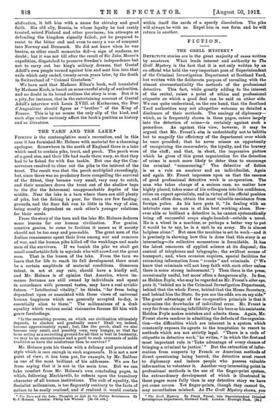THE TARN AND THE LAKE.* FISHING is the contemplative man's
recreation, and in this case it has furnished Mr. Holmes with material for a charming apologue. Somewhere in the north of England there is a lake which used to contain pike, trout, and perch. The perch were of a good size, and their life had made them wary, so that they had to be fished for with fine tackle. But one day the Con- servators resolved to clear out the pike in the interest of the trout. The result was that the perch multiplied exceedingly, but, since there was no predatory force compelling the survival of the fittest, they became very small, very easy to catch, and their numbers drove the trout out of the shallow bays to the (for the fisherman) unapproachable depths of the middle. Near the lake is a tarn where there are still plenty of pike, but the fishing is poor, for there are few feeding- grounds, and the finer fish run to little in the way of size, being mostly dependent on each other's younger relations for their meals.
From the story of the tarn and the lake Mr. Holmes deduces some lessons for our human civilization. For genius, creative genius, to come to fruition it seems as if society should not be too easy and peaceable. The great men of the Italian renaissance spent their lives among war and rumours of war, and the human pike killed off the weaklings and made men of the survivors. If we banish the pike we shall get small comfortable folk in myriads who will crowd out the great men. That is the lesson of the lake. From the tarn we learn that for life to reach its full development there must be a certain amplitude of material conditions. Generous talent, in art at any rate, should have a kindly soil, and Mr. Holmes is of opinion that America, where im- mense fortunes are still owned by individuals and spent in accordance with personal tastes, may have a real artistic future. "Intellectual vitality," he thinks, "far from being dependent upon or associated with those views of universal human happiness which are generally accepted to-day, is essentially alien to them." The millenniums of a drab equality which various social visionaries foresee fill him with grave forebodings.
"Is the recruiting process, on which our civilization ultimately depends, to slacken and gradually cease ? Shall we, indeed, become approximately equal ; but, like the perch, shall we also become very small, and possibly very, very hungry, so that far from acting as a recruiting ground for all that is best in humanity, Nye may be an encumbrance and a peril to such remnants of noble tradition as have the misfortune then to survive ? "
Mr. Holmes puts his thesis with a delicacy and precision of style which is rare enough in such argument's. It is not a new point of view; it has been put, for example, by Mr. Balfour in one of the most brilliant of his addresses. We are far
from saying that it is not in the main true. But we can take comfort from Mr. Holmes's own concluding pages, in which, following Machiavelli, he reflects upon the transitory character of all human institutions. The cult of equality, the Socialist millennium, is too flagrantly contrary to the facts of nature to be easily realized, and if realized it would contain
• The Tarn and the Lake Thoughts on Life in the Italian Renaissance. By C. J. Holmes. Loudon, Philip Lee Warner. [2s. ed. net.]
within itself the seeds of a speedy dissolution. The pike will always be with us. Expel him in one form and he will return in another.


































 Previous page
Previous page